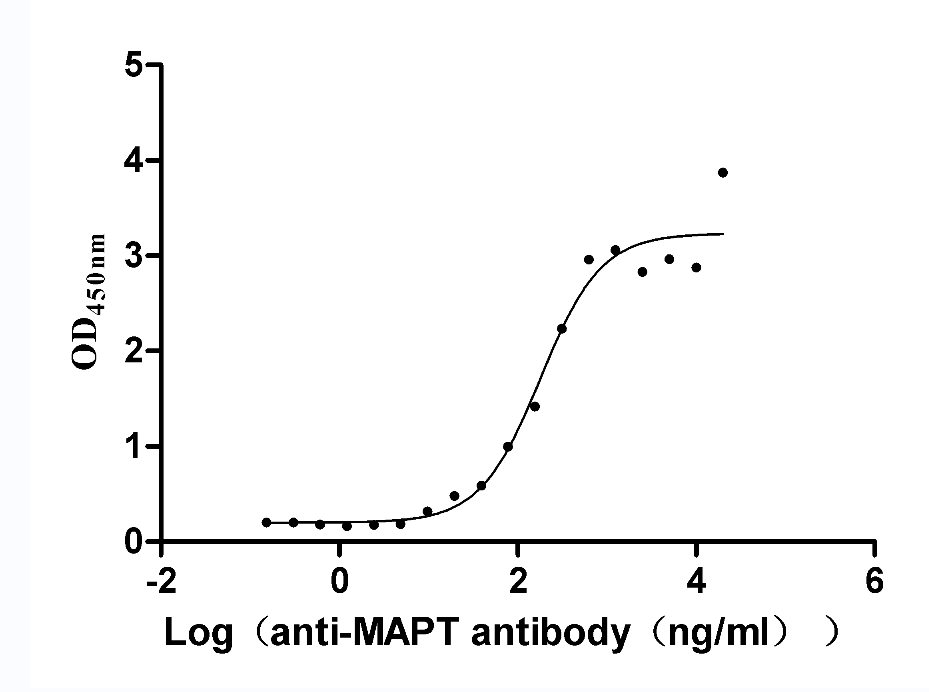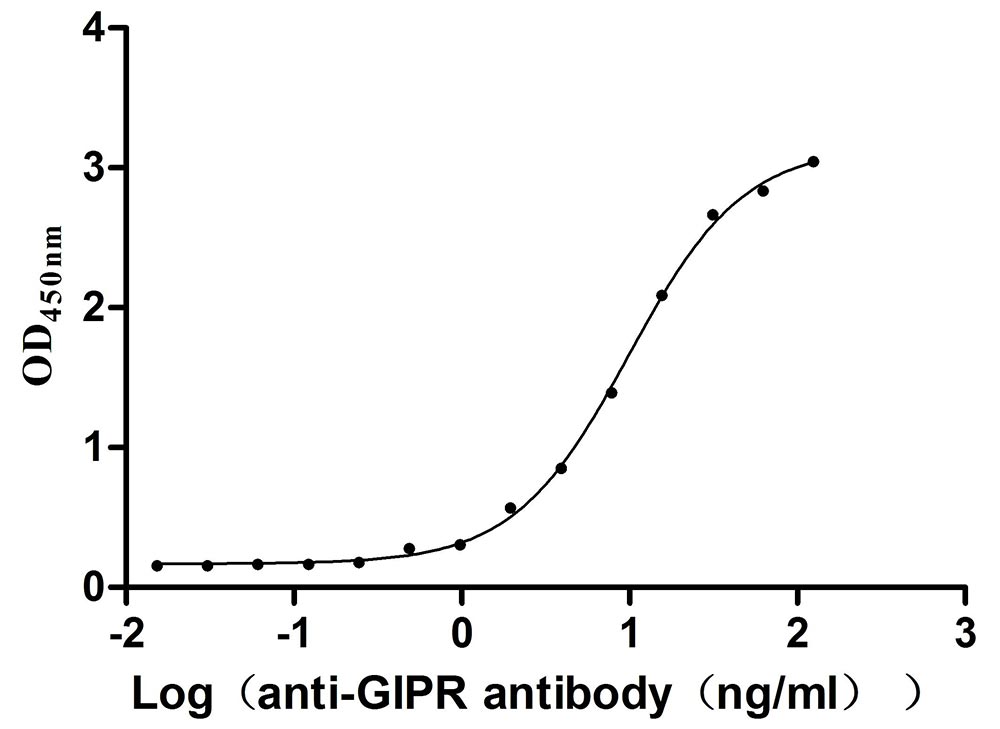Recombinant Human Angiopoietin-related protein 2 (ANGPTL2)
-
中文名稱:Recombinant Human Angiopoietin-related protein 2(ANGPTL2),Yeast
-
貨號:CSB-YP891539HU
-
規(guī)格:
-
來源:Yeast
-
其他:
-
中文名稱:Recombinant Human Angiopoietin-related protein 2(ANGPTL2),Yeast
-
貨號:CSB-EP891539HU-B
-
規(guī)格:
-
來源:E.coli
-
共軛:Avi-tag Biotinylated
E. coli biotin ligase (BirA) is highly specific in covalently attaching biotin to the 15 amino acid AviTag peptide. This recombinant protein was biotinylated in vivo by AviTag-BirA technology, which method is BriA catalyzes amide linkage between the biotin and the specific lysine of the AviTag.
-
其他:
-
中文名稱:Recombinant Human Angiopoietin-related protein 2(ANGPTL2),Yeast
-
貨號:CSB-BP891539HU
-
規(guī)格:
-
來源:Baculovirus
-
其他:
-
中文名稱:Recombinant Human Angiopoietin-related protein 2(ANGPTL2),Yeast
-
貨號:CSB-MP891539HU
-
規(guī)格:
-
來源:Mammalian cell
-
其他:
產(chǎn)品詳情
-
純度:>85% (SDS-PAGE)
-
基因名:ANGPTL2
-
Uniprot No.:
-
別名:AI593246; Angiopoietin like 2; Angiopoietin related protein 2 ; Angiopoietin-like protein 2; Angiopoietin-related protein 2; ANGL2_HUMAN; Angptl2; Arp2; AW260363; HARP; MGC8889; UNQ170/PRO196
-
種屬:Homo sapiens (Human)
-
蛋白長度:Full Length of Mature Protein
-
表達區(qū)域:23-493
-
氨基酸序列QEDGFEGT EEGSPREFIY LNRYKRAGES QDKCTYTFIV PQQRVTGAIC VNSKEPEVLL ENRVHKQELE LLNNELLKQK RQIETLQQLV EVDGGIVSEV KLLRKESRNM NSRVTQLYMQ LLHEIIRKRD NALELSQLEN RILNQTADML QLASKYKDLE HKYQHLATLA HNQSEIIAQL EEHCQRVPSA RPVPQPPPAA PPRVYQPPTY NRIINQISTN EIQSDQNLKV LPPPLPTMPT LTSLPSSTDK PSGPWRDCLQ ALEDGHDTSS IYLVKPENTN RLMQVWCDQR HDPGGWTVIQ RRLDGSVNFF RNWETYKQGF GNIDGEYWLG LENIYWLTNQ GNYKLLVTME DWSGRKVFAE YASFRLEPES EYYKLRLGRY HGNAGDSFTW HNGKQFTTLD RDHDVYTGNC AHYQKGGWWY NACAHSNLNG VWYRGGHYRS RYQDGVYWAE FRGGSYSLKK VVMMIRPNPN TFH
-
蛋白標簽:Tag?type?will?be?determined?during?the?manufacturing?process.
The tag type will be determined during production process. If you have specified tag type, please tell us and we will develop the specified tag preferentially. -
產(chǎn)品提供形式:Lyophilized powder
Note: We will preferentially ship the format that we have in stock, however, if you have any special requirement for the format, please remark your requirement when placing the order, we will prepare according to your demand. -
復溶:We recommend that this vial be briefly centrifuged prior to opening to bring the contents to the bottom. Please reconstitute protein in deionized sterile water to a concentration of 0.1-1.0 mg/mL.We recommend to add 5-50% of glycerol (final concentration) and aliquot for long-term storage at -20℃/-80℃. Our default final concentration of glycerol is 50%. Customers could use it as reference.
-
儲存條件:Store at -20°C/-80°C upon receipt, aliquoting is necessary for mutiple use. Avoid repeated freeze-thaw cycles.
-
保質期:The shelf life is related to many factors, storage state, buffer ingredients, storage temperature and the stability of the protein itself.
Generally, the shelf life of liquid form is 6 months at -20°C/-80°C. The shelf life of lyophilized form is 12 months at -20°C/-80°C. -
貨期:Delivery time may differ from different purchasing way or location, please kindly consult your local distributors for specific delivery time.Note: All of our proteins are default shipped with normal blue ice packs, if you request to ship with dry ice, please communicate with us in advance and extra fees will be charged.
-
注意事項:Repeated freezing and thawing is not recommended. Store working aliquots at 4°C for up to one week.
-
Datasheet :Please contact us to get it.
相關產(chǎn)品
靶點詳情
-
功能:Induces sprouting in endothelial cells through an autocrine and paracrine action.
-
基因功能參考文獻:
- examination of the potential sources of circulating ANGPTL2 and its common pathological properties associated with various chronic inflammatory diseases (review). PMID: 29138671
- Results showed that ANGPTL2 was highly expressed in glioma tissues and cell lines. Knockdown of ANGPTL2 reduced the proliferative and invasive abilities of glioma cells. PMID: 28247845
- REVIEW: ANGPTL2 autocrine/paracrine signaling is a new factor in accelerating heart disease development in the aging. Here, we focus on current topics relevant to ANGPTL2 function in heart disease. PMID: 28867689
- ANGPTL2 is a biomarker for liver fibrosis in chronic hepatitis B patients with normal to minimally raised ALT. PMID: 28962551
- ANGPTL2 was positively associated with aortic stiffness after kidney transplantation. PMID: 28158589
- Serum ANGPTL2 levels were significantly increased in non-small cell lung carcinoma patients, which could serve as a novel potential diagnostic and prognostic biomarker for NSCLC. PMID: 28164488
- Results reveal a novel cascade comprising sequential P. gingivalis lipopolysaccharide --> ANGPTL2 --> integrin alpha5beta1 --> inflammatory cytokine induction, which might be responsible for inducing potent periodontal disorganization activity in gingival epithelial cells. Via this pathway, ANGPTL2 functions in the pathogenesis of periodontitis and contributes to prolonging chronic inflammation in patients with systemi... PMID: 28934245
- In patients with type 2 diabetes, serum ANGPTL2 concentrations were independently associated with death and MACE. PMID: 27491833
- Elevated serum ANGPTL2 levels are a novel risk factor for the development of CVD in the general population. This association is partially mediated by metabolic disorders and inflammation. PMID: 27365403
- Increased ANGPTL2 expression contributes to proliferation and invasion of gastric cancer cells. PMID: 28058016
- Aberrant expression of ANGPTL2 in cumulus cells is potentially associated with impaired oocyte developmental competence in polycystic ovary syndrome. PMID: 26829602
- Reduced leukocyte DNA methylation in the promoter region of ANGPTL2 is associated with the pro-inflammatory environment that characterizes patients with post-ACS differently from age-matched healthy controls. Methylation of different CpGs in ANGPTL2 gene may prove to be a reliable biomarker of coronary disease PMID: 27101308
- At 11-13 weeks in pregnancies that develop GDM, the serum concentration of ANGPTL2 is increased, and it can be combined with maternal factors to provide effective early screening for GDM. PMID: 27647189
- ANGPTL2 and TGF-beta1 positively regulate each other as renal fibrosis progresses. PMID: 26806834
- ANGPTL2 may be a useful marker for detecting early postoperative recurrence in patients with gastric cancer. PMID: 26254352
- In lumbar spinal stenosis, Angptl2 promotes inflammation in ligamentum flavum(LF) tissue by activating IL-6 expression, leading to LF degeneration and hypertrophy. PMID: 25735609
- ANGPTL2 promotes adipose tissue macrophage and T lymphocyte accumulation and leads to insulin resistance. PMID: 26132105
- Serum ANGPTL2 in GC patients was significantly higher than for healthy controls. PMID: 26420253
- Angptl2 induces proinflammatory responses in peritoneal macrophages and monocytes. PMID: 26435501
- Serum ANGPTL2 concentration was associated with carotid atherosclerosis in patients with type 2 diabetes. PMID: 25889082
- these findings are the first to suggest a considerable role for Angptl2 in the pathogenesis of unstable coronary disease in a clinical context PMID: 25999029
- These results suggested that ANGPTL2 was a potential biomarker for gastric cancer. PMID: 25484242
- Serum ANGPTL2 improves preoperative detection of LN metastasis in CRC PMID: 25964566
- Serum ANGPTL2 is a novel diagnostic and recurrence-predictive biomarker in patients with colorectal cancer. PMID: 25294915
- ANGPTL2 may be important in the acquisition of androgen independency and tumor progression of prostate cancer in an autocrine and/or paracrine manner via the integrin alpha5beta1 receptor. PMID: 25370833
- Serum ANGPTL2 levels in patients with metastatic breast cancer were significantly higher than those in healthy subjects or in patients with ductal carcinoma in situ or non-metastatic invasive ductal carcinoma. PMID: 24585434
- abnormal upregulation of ANGPTL2 in colorectal cancer is associated with miR-25 downregulation PMID: 25174582
- This review aims at presenting an updated description of both the beneficial and deleterious biological properties of angptl2, in addition to its molecular signalling pathways and transcriptional regulation PMID: 25417860
- Results show that ANGPTL2 antagonizes apoptosis by increasing Syk expression in colorectal cancer cells resistant to chemotherapy. PMID: 25287946
- ANGPTL2 positively regulates endothelial colony forming cell vascular lumen formation. PMID: 24563071
- findings demonstrate that preventing ANGPTL2 signaling stimulated by the tumor microenvironment could inhibit tumor cell migration and metastasis PMID: 24448647
- expression of Angptl2 induced by mechanical stress in ligamentus flavum (LF) fibroblasts promotes LF tissue degeneration. PMID: 24465594
- Endothelial cell-derived Angptl2 accelerates vascular inflammation by activating proinflammatory signaling in endothelial cells and increasing macrophage infiltration, leading to endothelial dysfunction and atherosclerosis progression. PMID: 24526691
- Elevated serum Angptl2 is associated with the likelihood of CKD in the general population. PMID: 23739531
- Angptl2 levels are elevated in patients with type 2 diabetes with an independent association between increasing Angptl2 levels and increasing levels of albuminuria. PMID: 23602322
- periodic expression of ANGPTL2 is regulated by a molecular clock PMID: 23469106
- In epicardial adipose tissue from coronary heart disease patients, ANGPTL2 expression was positively correlated with that of TNF-alpha. PMID: 23333801
- Elevated serum ANGPTL2 levels were positively associated with the development of T2DM in a general population, independent of other risk factors including hs-CRP levels. PMID: 22966088
- ANGPTL-2 and -3 have enhancing effect on human hematopoietic progenitor cell survival, effects requiring the CC domain of the ANGPTL molecules. PMID: 21983347
- Macrophage-derived Angptl2 contributes to abdominal aortic aneurysm development by inducing inflammation and degradation of extracellular matrix in the vessel wall. PMID: 22556334
- tumor cell-derived ANGPTL2 drives metastasis and provided an initial proof of concept for blockade of its action as a strategy to antagonize the metastatic process. PMID: 22345152
- keratinocyte-derived Angptl2 functions in dermatomyositis pathogenesis by inducing chronic inflammation in skin tissue. PMID: 22281496
- Angptl2 acts as an important rheumatoid synovium-derived inflammatory mediator in RA pathogenesis PMID: 20304962
- The upregulation of ANGPTL2 in diabetic glomerulopathy shows a close relationship to abnormal microvasculature and endothelial inflammation. PMID: 17347581
- epigenetic silencing by hypermethylation of the ANGPTL2 promoter leads to a loss of ANGPTL2 function, which may be a factor in the carcinogenesis of ovarian cancer in a stage-dependent manner. PMID: 18593905
- Angiopoietin-like protein 2 (Angptl2) was secreted by adipose tissue and that its circulating level was closely related to adiposity, systemic insulin resistance, and inflammation in humans. PMID: 19723494
顯示更多
收起更多
-
亞細胞定位:Secreted.
-
組織特異性:Widely expressed in heart, small intestine, spleen and stomach. Also found in lower levels in colon, ovary, adrenal gland, skeletal muscle and in prostate.
-
數(shù)據(jù)庫鏈接:
Most popular with customers
-
Recombinant Human SARS coronavirus Spike glycoprotein (S), partial (Active)
Express system: Mammalian cell
Species: Human SARS coronavirus (SARS-CoV) (Severe acute respiratory syndrome coronavirus)
-
Recombinant Mouse GDNF family receptor alpha-like (Gfral), partial (Active)
Express system: Mammalian cell
Species: Mus musculus (Mouse)
-
Recombinant Rat Microtubule-associated protein tau (Mapt) (Active)
Express system: Mammalian cell
Species: Rattus norvegicus (Rat)
-
Recombinant Human Mucin-17 (MUC17), partial (Active)
Express system: Mammalian cell
Species: Homo sapiens (Human)
-
Recombinant Human Desmoglein-3 (DSG3), partial (Active)
Express system: Baculovirus
Species: Homo sapiens (Human)
-
Recombinant Mouse Gastric inhibitory polypeptide receptor (Gipr), partial (Active)
Express system: Mammalian cell
Species: Mus musculus (Mouse)
-
Recombinant Human B- and T-lymphocyte attenuator(BTLA), partial (Active)
Express system: Mammalian cell
Species: Homo sapiens (Human)
-
Express system: Mammalian cell
Species: Homo sapiens (Human)




















